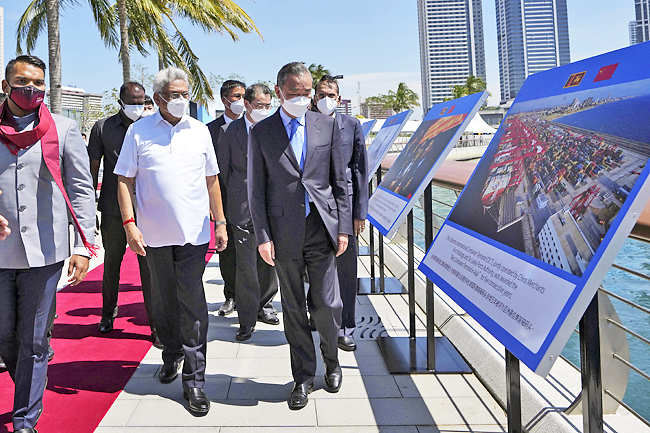COLOMBO, SRI LANKA (AP) – Chinese Foreign Minister Wang Yi was in Sri Lanka yesterday seeking to advance Beijing’s ambitious Belt and Road Initiative as the island nation tries to rescue itself from a foreign currency and debt crisis.
Wang arrived in Sri Lanka on Saturday from the Maldives on the last leg of a multi-city trip that also took him to Eritrea, Kenya and Comoros in Africa.
In Sri Lanka, Wang met with President Gotabaya Rajapaksa and Prime Minister Mahinda Rajapaksa. Later, Wang and the prime minister spoke at Colombo’s Port City, a reclaimed island developed with Chinese investment.
The visit comes as Sri Lanka faces one of its worst economic crises, with foreign reserves down to around USD1.6 billion, barely enough for a few weeks of imports.
It also has foreign debt obligations exceeding USD7 billion in 2022, including repayment of bonds worth USD500 million in January and USD1 billion in July. China loaned money to build a seaport and airport in the southern Hambantota district, in addition to a wide network of roads.
Central Bank figures show that current Chinese loans to Sri Lanka total around USD3.38 billion not including loans to state-owned businesses, which are accounted for separately.
“Technically we can claim we are bankrupt now,” said principal researcher at the Point Pedro Institute of Development Muttukrishna Sarvananthan.

“When you have foreign reserves in the red, that means you are technically bankrupt.”
The situation has left households facing severe shortages.
People wait in long lines to buy essential goods like milk powder, cooking gas and kerosene.
Prices have increased sharply and the Central Bank said the inflation rate rose to 12.1 per cent by the end of December from 9.9 per cent in November. Food inflation increased to over 22 per cent in the same period.
Because of a currency shortage, importers are unable to clear their cargo containing essentials and manufactures are not able to buy raw materials from overseas.
Expatriate remittances have also fallen after the government ordered the mandatory conversion of foreign currency and controls over exchange rates.
Rating agency downgrades have resulted in Sri Lanka losing much of its borrowing power.
In December, Fitch Ratings noted an increased probability of credit default.
The Central Bank has added a currency swap in Chinese currency worth USD1.5 billion to the reserves but economists disagree whether it can be part of foreign reserves or not.
Wang’s visit also has regional significance, as both China and India, Sri Lanka’s closest neighbour, vie for influence in the island.






